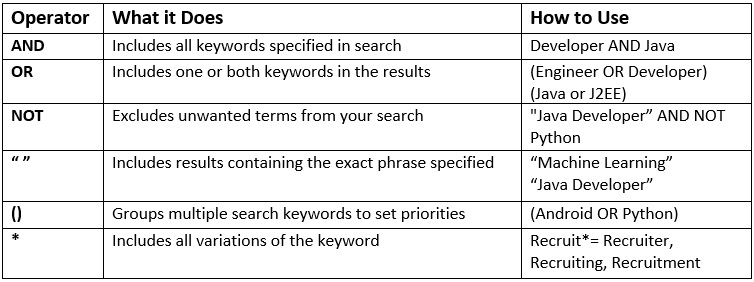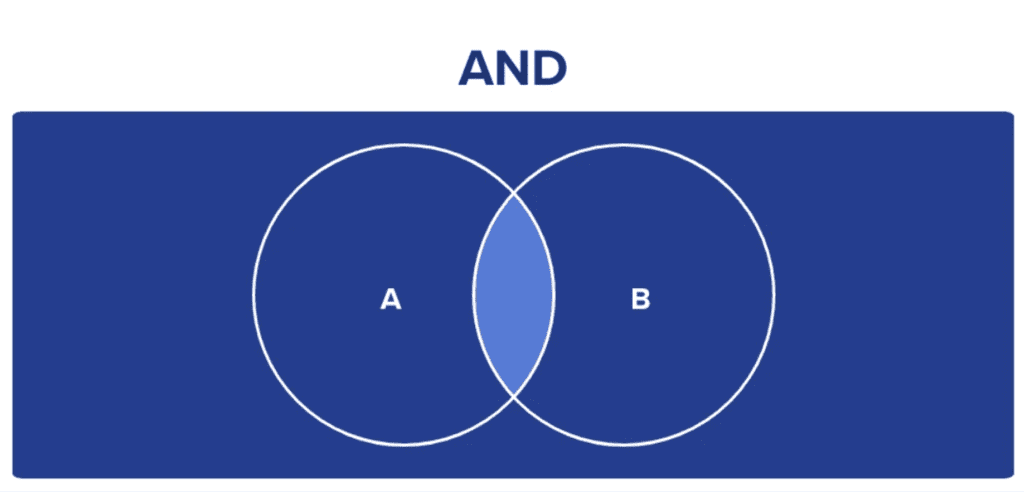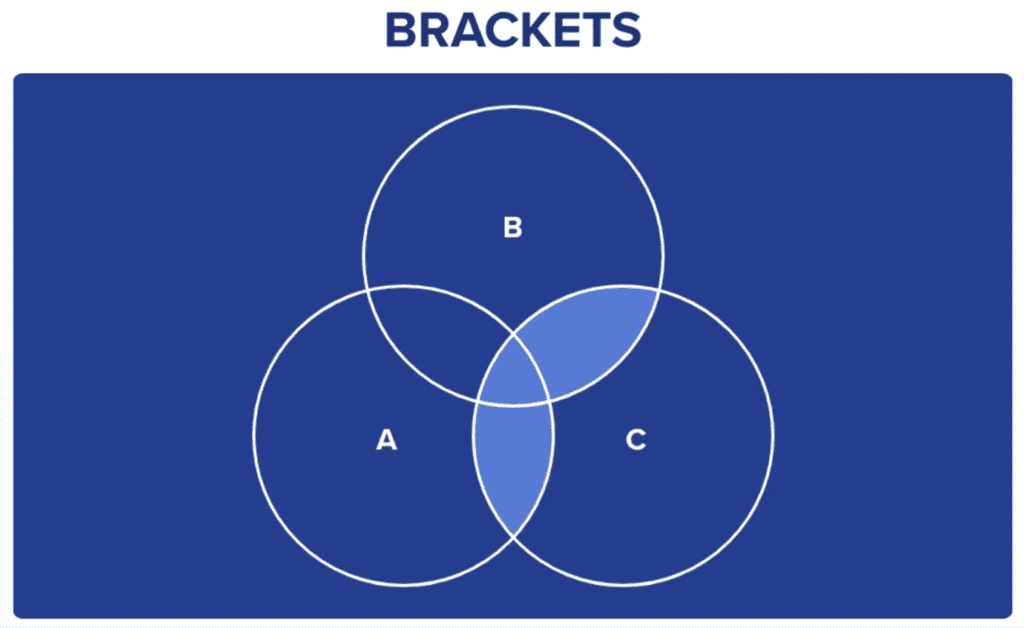A Complete Guide to Boolean Search for Recruiters

What is Boolean Job Search?
Boolean search is a tool that uses logical operators such as AND, OR, and NOT to improve the efficiency of hiring efforts. Employers can ensure a more targeted and fruitful search by using boolean operators to identify applicants who meet specified skills and qualifications. By applying Boolean, recruiters can narrow down their results to include only those candidates who meet particular criteria, such as certain experience or expertise, while excluding irrelevant profiles. Employers may find qualified applicants for available positions more quickly and precisely with the help of this method, which expedites the search process and increases the efficiency of their recruitment strategy.
Boolean Search Terms
Boolean search helps refine searches by using operators like AND, OR, and NOT to tailor results to specific criteria. These words help limit, broaden, or focus the search, making it easier to find exactly what is needed. By leveraging Boolean logic, recruiters and professionals can utilize search engines and platforms like LinkedIn more effectively, ensuring they get relevant results that align with their goals.

6 Best Boolean Operators for Search Strings
AND
Using the AND operator in boolean search is a classic technique for combining multiple keywords to refine search results. When two keywords are separated by AND, the search engine is told to only show results that contain both terms. If you search for Developer AND Java, for instance, you can be sure that the search results will only show people who have experience in both fields. Those with experience limited to one of these specialties, such as Java, will not be considered. This narrows down the field of candidates to assist in identifying those who possess the precise skill set needed for the position.

OR
The OR operator in boolean search allows recruiters to expand their search by including candidates with either of the listed keywords. In order to ensure that no eligible applicants are overlooked, this tool is particularly helpful for capturing several phrasing variations of the same word. If you search for (Engineer OR Developer), (Java OR J2EE), for example, you will find candidates who use either title, even those who could have a different experience description. Recruiters can ensure they find all possible candidates who fulfill the role’s broader qualifications by using OR to cast a wider net.

NOT
In boolean search, the NOT operator is used to remove certain terms from the results. It facilitates search refinement by eliminating unwanted qualifications or experiences. To filter out individuals with experience as Java developers, one might search for “Java Developer” AND NOT Python. This will only display applicants with expertise in Java Developer. Recruiters can find applicants with the precise background they require by using this strategy.

Quotation Marks
To locate the precise term you’re looking for, use quotation marks in your searches. For instance, doing a search for “Machine Learning”, “Java Developer”, guarantees that the search engine will only show results that have these particular skills. When quote marks are omitted, the search engine could produce irrelevant results, like publications that only contain the terms “Machine” and “Learning” separately. By doing this, irrelevant results are avoided, and candidates or information directly related to the searched word is found more accurately.
Parenthesis or Brackets
In advanced Boolean searches, grouping terms with parenthesis is crucial because it affects how the search engine interprets the keywords, much like in math. The search engine is instructed to analyze the terms included in parenthesis first. For example, the search engine searches for people containing the exact phrase specified, when the query is written as (Android OR Python). The search results are shaped by the parenthesis, which makes it possible to filter candidates more precisely.

Asterisk
In searches, the wildcard (*) function is a helpful tool for capturing keyword variations. For example, typing recruit* will provide results for recruiter, recruiting, recruitment, and other phrases. Recruiters wishing to broaden their search beyond a certain title or term will find this option very helpful as it ensures a wider range of pertinent applicants or information is included in the results. Better talent sourcing is made possible by using wildcards to make the search process more thorough and efficient.
Importance of Boolean Search in Recruitment
Accuracy
Utilizing specific terms for boolean searching allows for precision in finding the exact information needed. Recruiters may use Boolean search strings, recruiters can significantly minimize the time spent. This targeted approach ensures that only the most relevant candidates or data are presented, enhancing the efficiency of the recruitment process. Consequently, recruiters can focus their efforts on high-quality prospects, leading to faster and more effective hiring decisions.
Efficiency
Gaining proficiency in boolean searching can greatly improve a recruiter’s ability to find a vast pool of candidates quickly. This method makes resume searches more effective by helping to shift through large datasets and find people who fit particular requirements. Recruiters may more efficiently find relevant talent, expedite the hiring process, and establish more effective connections with qualified prospects by customizing their searches with Boolean operators.
Opportunity
Not all candidates online are actively seeking job opportunities, which is where Boolean search becomes invaluable. Recruiters can use this strategy to find passive applicants that meet the job criteria with their abilities and experience but may not be actively searching job boards. Employing boolean operators and targeted keywords, recruiters can find profiles of people who might be receptive to new chances if they reach out to them. Engaging with these passive candidates can significantly broaden the talent pool and lead to finding high-quality hires who might not have been discovered through traditional recruitment methods or job title.
Conclusion
FAQs
What is Boolean search in recruitment?
Boolean search in recruitment refers to using logical operators like AND, OR, and NOT to create more refined and targeted candidate searches across platforms like job boards, LinkedIn, and databases.
Why is Boolean search important for recruiters?
It helps recruiters find qualified candidates faster by narrowing or expanding search results based on specific skills, titles, or experience levels, increasing both accuracy and efficiency.
How does the AND operator work in Boolean search?
The AND operator shows results that contain all specified terms. For example, searching “Java AND Developer” will return profiles that include both keywords.
What is the purpose of using quotation marks in Boolean searches?
Quotation marks are used to find exact phrases. Searching for “Machine Learning” ensures results include that exact term rather than just “Machine” and “Learning” separately.
Can Boolean search help find passive candidates?
Yes, Boolean search is effective in identifying passive candidates who may not be actively job hunting but match the required skills and job criteria based on their profiles or online presence.
Written By

KTRIAN
Author
Last Update
16/10/24 12:00 PM
Category
Share
-
Facebook
-
Twitter
-
Linkedin
